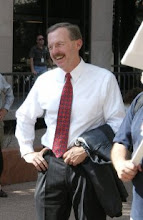
How MI5 spent 18 years hunting the spy it had already caught - Times Online
Excerpt: In June 1934 Kim Philby, who had graduated from Trinity College, Cambridge, in the previous year with the conviction that “my life must be devoted to communism”, had his first meeting with his Soviet controller, Dr Arnold Deutsch.
The rendezvous took place in Regent’s Park. Philby became the first of the “Cambridge Five”, the ablest group of British agents ever recruited by a foreign intelligence service.
Deutsch asked Philby to recommend some of his Cambridge contemporaries. His first two nominations were Donald Maclean, who had just graduated from Trinity Hall with first-class honours in modern languages, and Guy Burgess, of Trinity College, who was working on a history PhD thesis which he was never to complete.
By the end of 1934, with Philby’s help, Deutsch had recruited both, telling them – like Philby – to distance themselves from communist friends. Burgess did so with characteristic flamboyance, becoming personal assistant in the following year to the right-wing Conservative MP Captain “Jack” Macnamara, with whom he went on fact-finding missions to Nazi Germany which, according to Burgess, were largely devoted to sexual escapades with gay members of the Hitler Youth.
The first of the Cambridge Five to penetrate the “bourgeois apparatus” was Maclean, who entered the Foreign Office in 1935. Burgess’s main role in his early years as a Soviet agent was a talent-spotter. Early in 1937, by then a BBC producer, he arranged the first meeting between Deutsch and Anthony Blunt, French linguist, art historian and Fellow of Trinity College, Cambridge.
Blunt in turn identified as a likely recruit his former pupil John Cairncross, a passionate Scottish Marxist nicknamed “The Fiery Cross” who in 1936 had graduated from Trinity with first-class honours in modern languages and come top in the Foreign Office entrance examination.
All were inspired by the myth-image of Stalin’s Russia as a worker-peasant state with social justice for all, free from the exploitation and alienation of the capitalist system. The message of liberation had all the greater appeal for the Five because it had a sexual as well as a political dimension. Burgess and Blunt were gay and Maclean bisexual at a time when homosexual relations were illegal. When the war ended, four of what were later called the “Magnificent Five” were still in place in Britain. Philby was in MI6 with, some believed, the potential to become a future “C”.
The rendezvous took place in Regent’s Park. Philby became the first of the “Cambridge Five”, the ablest group of British agents ever recruited by a foreign intelligence service.
Deutsch asked Philby to recommend some of his Cambridge contemporaries. His first two nominations were Donald Maclean, who had just graduated from Trinity Hall with first-class honours in modern languages, and Guy Burgess, of Trinity College, who was working on a history PhD thesis which he was never to complete.
By the end of 1934, with Philby’s help, Deutsch had recruited both, telling them – like Philby – to distance themselves from communist friends. Burgess did so with characteristic flamboyance, becoming personal assistant in the following year to the right-wing Conservative MP Captain “Jack” Macnamara, with whom he went on fact-finding missions to Nazi Germany which, according to Burgess, were largely devoted to sexual escapades with gay members of the Hitler Youth.
The first of the Cambridge Five to penetrate the “bourgeois apparatus” was Maclean, who entered the Foreign Office in 1935. Burgess’s main role in his early years as a Soviet agent was a talent-spotter. Early in 1937, by then a BBC producer, he arranged the first meeting between Deutsch and Anthony Blunt, French linguist, art historian and Fellow of Trinity College, Cambridge.
Blunt in turn identified as a likely recruit his former pupil John Cairncross, a passionate Scottish Marxist nicknamed “The Fiery Cross” who in 1936 had graduated from Trinity with first-class honours in modern languages and come top in the Foreign Office entrance examination.
All were inspired by the myth-image of Stalin’s Russia as a worker-peasant state with social justice for all, free from the exploitation and alienation of the capitalist system. The message of liberation had all the greater appeal for the Five because it had a sexual as well as a political dimension. Burgess and Blunt were gay and Maclean bisexual at a time when homosexual relations were illegal. When the war ended, four of what were later called the “Magnificent Five” were still in place in Britain. Philby was in MI6 with, some believed, the potential to become a future “C”.




No comments:
Post a Comment